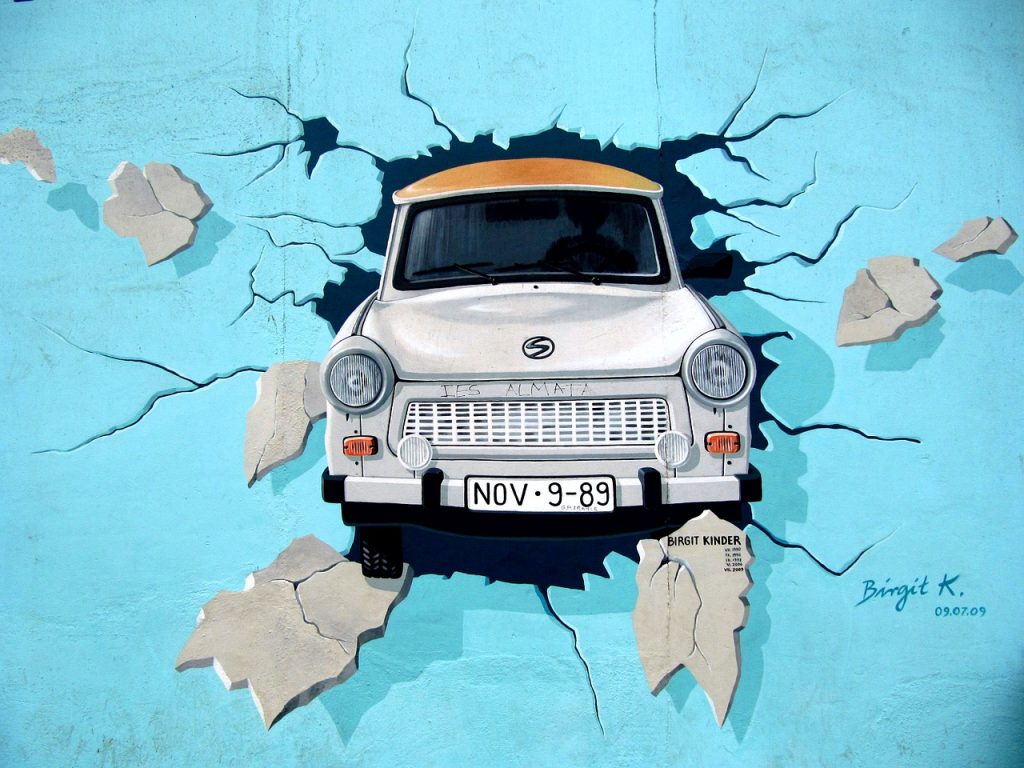November 9 in German History Posted by Constanze on Nov 14, 2018 in Language
Guten Tag! November is a big month in German history, as many significant historical events happened on or around November 9th. In fact, so many things have happened throughout history on November 9th in Germany that this date is now known as der Schicksaltag – the ‘fate day’. Today I’m writing about two events from November 9th which are extremely different, but extremely significant in shaping Germany as it is today.
The first is Reichspogromnacht, perhaps more commonly known as Kristallnacht. On November 9 1938, the Nazis murdered several hundred Jews, and burned down synagogues and other shops/properties with Jewish owners. Before this, the Nazis had persecuted Jews in social and political ways, but this night marked the first time they used physical violence against them. For this reason, November 9 1938 is often referred to as the beginning of the Holocaust.
The language used to describe these events is still important. The word Kristallnacht literally means ‘Crystal Night’ and is translated into English as ‘The Night of Broken Glass’. The name refers to the shards of glass that lined the streets on November 9, once all of the windows had been smashed and the homes and properties destroyed.
Nowadays, this name is criticised for downplaying the severity of the situation, and so November 9 1938 is often referred to as Reichspogromnacht, instead. This word literally means ‘Kingdom’s Pogrom Night’ and is considered less offensive because it describes the act for what it actually was. You may also see it called Pogromnacht (‘Pogrom Night’) and Novemberpogrom (‘November Pogrom’).
The second event that happened on November 9 was the fall of the Berlin Wall in 1989. The Berliner Mauer (Berlin Wall) was built in 28 years earlier, in August 1961, following the dividing of the country into East Germany and West Germany after World War II. It was intended as a way to physically stop people fleeing East Berlin. This post will tell you more about why the Berlin Wall was built.
Following mass protests and demonstrations, on November 9 1989, German officials announced that the wall will be abolished and that East Berliners were free to enter West Berlin, and vice versa. Citizens literally tore down the wall and climbed over the rubble, many becoming reunited with long-lost friends and relatives. It is one of Germany’s most special moments in history, and it is still celebrated today.
Although November 9 was the date the Berliner Mauer fell, this event is celebrated as a national holiday on October 3, instead (German Unity Day – Tag der Deutschen Einheit). This is because it was deemed inappropriate to have a national holiday and celebrations on November 9, as the date was so closely associated with the horrific acts of the Nazis upon the Jewish people on Reichspogromnacht. October 3 1990 was the date that Germany officially reunified, so it is October 3 when the national holiday is held. If you’d like to know more about the German reunification, see this post.
Other notable events that happened in Germany on November 9 are:
1918: Kaiser Wilhelm II dethroned
1922: Albert Einstein awarded the Nobel Peace Prize
1923: Day of Adolf Hitler’s failed Beer Hall Putsch

Build vocabulary, practice pronunciation, and more with Transparent Language Online. Available anytime, anywhere, on any device.





Comments:
stephen barden:
Constanze,
To blithely describe Nazi persecution of Germans of Jewish faith as being purely “social and political”, is not only insensitive it’s totally inaccurate. Banning people from working in certain professions and from intermarrying; stripping them of their citizenship and forcing them to “sell” their businesses, is not social or political. It is a fundamental attack on their human existence. One quick look at a simple chart (at http://www.bbc.co.uk/schools/gcsebitesize/history/tch_wjec/germany19291947/2racialreligiouspolicy1.shtml)
should set the record straight.
Constanze:
@stephen barden Stephen,
I did not mean to cause any offence by writing the words ‘social and political’; I was trying to summarise why the events of Nov 9th were significant. Do you perhaps have a suggestion for how I could re-word that sentence? Thanks for your input! Constanze